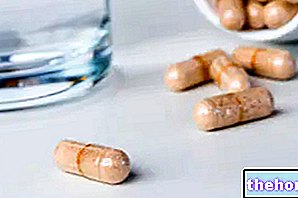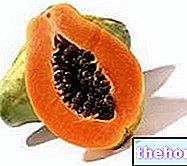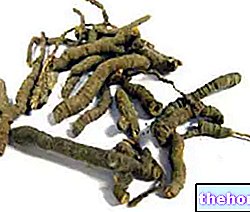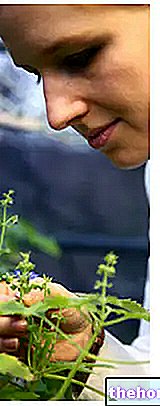Medicines with diuretic action are used in the treatment of renal failure, hypertension, glaucoma, liver cirrhosis and heart failure.
There are also some natural remedies and foods that are endowed with a certain diuretic activity.
Diuretics, even if naturally derived, can nevertheless have serious repercussions on the body's water balance, especially if misused, used in excess (abuse) or used when not needed.
that can occur following the expulsion of large quantities of liquids, in fact, it is an apparent and not real weight loss, since the quantities of liquids lost are then replenished.Even in some sports areas the use of diuretic products is resorted to, for example, in those sports in which weight is essential to be able to fall and compete in a certain category. The use of diuretics combined with physical activity, however, is very dangerous, since with sport you lose considerable quantities of liquids by sweating.
Still others, however, resort to the use of diuretics to try to combat water retention and related disorders. However, even in this case, with the exception of pathological situations that the doctor deems it necessary to treat with diuretic drugs, the use of products that increase diuresis is useless if not dangerous (to learn more, read the dedicated article "Water Retention").
with marked diuretic properties. To realize this, just eat, for example, a slice of watermelon or some boiled asparagus.
The list of natural diuretics is very long, some are contained in commonly used foods, others in particular herbs from different countries of the world:
- Pineapple: has an anorectic effect and promotes diuresis.
- Birch: helps fight the stagnation of liquids (leaves).
- Artichoke: this plant has the ability to stimulate liver and kidney function.
- Cucumber: has refreshing, purifying and diuretic properties.
- Onion: aids in the natural production of urine.
- Horsetail.
- Fennel: in addition to the moderate vitamin and mineral content, they are rich in active ingredients that make them suitable for gastrointestinal problems and give them emmenagogic, galactogenic, antiseptic and diuretic properties.
- Apple: this very common fruit also hides strong diuretic properties.
- Nettle: the extracts of this plant improve kidney function by increasing the production of urine and accelerating the elimination of toxic substances.
- Elderberry flowers.
- Corn stigmas prepared in the form of an infusion.
- Dandelion (or dandelion or dandelion): to purify the body by exploiting its strong natural diuretic properties, we recommend an infusion of roots and leaves at 5% to be taken between meals.
Other Diuretics
Caffeine or theine, low sodium waters, grapes, celery, potatoes, borage, goldenrod, pilosella.
PLEASE NOTE!
We remind you that diuretics, even if natural, must be taken under medical supervision.
Select plant Fir Acacia Acerola Sorrel Yarrow Yarrow Yarrow Aconito Adatoda Garlic Agnocasto Agrimonia Alchemilla Alkekengi Aloe Altea Witch Hazel Ammi or Visnaga Pineapple Andrographis Anemone Pulsatilla Angelica Anise Star Anise Japanese Star Anise Bitter Orange Bitter Areca Arnica Harpagophytum Arpagophyte Artemisia Asteragus Basil Asparagus Asparagus Peruvian Asparagus Asparagus Asparagus Hawthorn Boldo Borage Shepherd's Purse Boswellia Bucco Butea superba Cocoa Coffee Cajeput Calamus Calamus Marigold Camedrio Chamomile Roman Chamomile Camphor Cinnamon Ceylon Maidenhair Capuchin Artichoke Cardamom Cardiac Thistle Asian Thistle Carvi Cascara Cassia Catecu Catha Cabbage Celandine Chicory Centaurea Cinnamon Cypress Celandine Chives Cypress Coca Cola Colchico Combreto Condurango Comfrey Coriander Cranberry Barberry American Chrysanthemum Cumin Turmeric Damiana Digital Dioscorea Drosera Dulcamara Dunalilella Echinacea Eder a Ephedra Elenio Eleutherococcus Helichrysum Evening primrose Horsetail Alfalfa Erica Euphrasia Erisimo Escolzia Eucalyptus Farfara Farfaraccio Calabar bean Fenugreek Fennel Phytolacca Frangola Ash Fumaria Japanese Mushrooms Galega Ganoderma lucidum Garcinia Cambogia Mulberry Gentian Broom Ginkgo Ginkgo Guipana Guipana Gynestra Ginkgo Hibelia Gymnasium Hibiscus Guarulp St. John's Wort Horse Chestnut Ispaghul Hyssop Jaborandi Kava kava Konjac Laminaria Cherry Laurel Lavender Lemongrass Lespedeza Lovage Icelandic Lichen Lemon Flax Lippia Licorice Lobelia Hops Maca Marjoram Maize Mallow Manna Marrubio Marrubio d "water Matè Melaleuca Meliloto American Lemon balm Myrtle Myrama Walnut Nutmeg Walnut vomica Olive tree Meadowsweet Ononide Opuntia Oregano Orthosiphon Nettle Poppy Papaya Parietaria Feverfew Passiflora Chilli Perilla Periwinkle Phyllanthus Plantain Picrorhiza Pilosella Pino Pisci dia Podofillo Polygala Grapefruit Parsley Psyllium Pueraria mirifica Butcher's broom Pygeum Quassia Oak Rhubarb Ratania Rauwolfia currant Castor bean Rhodiola Rosehip Rosemary Rue Willow Sarsaparilla Sage Elderberry Sassafras Sedum Ergot Senna Serenoa Repens Soybean Solidago Tansy Taraxus Tamarind Tamarind Tamarind Tamarind Tamarindo Ursina Valerian Vanilla Mullein Verbena Veronica Viburnum Vinca Pansy Mistletoe Vine Withania Yohimbe Saffron Ginger Pumpkin Select disease Juvenile Acne Rosacea Tinnitus Tinnitus Aerophagia Tendon Affections Afonia Aphthae Algias Functional Halitosis Breastfeeding Allergy Anemia Anguish Anxiety Arteriosclerosis Asthrosis Asthrosis Arthritis Arthritis Men Sex Woman Blepharitis and Conjunctivitis Eye bags Bronchitis Gallstones Kidney stones Salivary stones Baldness Androgenetic Candida Fragile hair Caries Headache Cellulitis Motion sickness Cystitis C limaterio Cholecystopathy High cholesterol Ulcerative colitis Colonoscopy Contusions Hematoma Convalescence Couperose Depression Dermatitis Diaper dermatitis Diabetes Diarrhea Erectile dysfunction Dyslipidemia Dysmenorrhea Dyspepsia Disturbances of vision Hemorrhoids Epistaxis Herethism Heart disease Fever Fibromyalgia Gastro-intestinal disease Flatulence Hypertension Fibromyalgia Gastrointomnia Jaundice Laryngitis Renal lithiasis Toothache Sore throat Thinness Menopause Meteorism Mononucleosis Alzheimer's disease Crohn's disease Nausea Vomiting Obesity Dark circles Onychomycosis Osteoporosis Dry skin Periarthritis Piorea Low pressure Prostatitis Psoriasis Colds Breast fissures Anal fissures Gastro-nasal rhinitis Senescence Premenstrual Syndrome Sinusitis Quit smoking Overweight Fatty liver Constipation Stomatitis Stress Cough Triglycerides high Ulcer Burns Nails Brittle flashes Heat Warts Dizziness Properties herbal Tanning Abortive adaptogenic Aphrodisiac bittering analgesic anesthetic anorectics analgesic antacid anti-allergic anti-asthmatic Antibiotic catarrh Anticellulitiche anticonvulsant Antidiaforetiche antidiarrheal edematous anthelmintic antiemetic Antiemorroidarie antiphlogistic Antiidrotiche Antinevrotiche Antioxidants antipyretic antirheumatic antiscorbutic Antiseptic antispasmodic anti-uric Aperitive Flavoring Astringent Balsamic Bechiche Capillarotrope Cardiotonic Carminative Cathartic Caustics Healing Cholagogues Choleretic Dyes Decongestants Deodorants Purifying Diaphoretic Cleansers Disinfectants Detoxifiers Thirst quenching Diuretics Exciting Emetics Emmenagogues Emollients Hemostatic Energies Hepatoprotectors Expectorants Eupepticus Moisturisers Galactosensitizers lanti Hypertensive Hypnotic Hypoglycemic Hypotensive Irritants Laxatives Soothing Narcotic Nerves Nutrients Odontalgic Pectoral Purgative Revulsive Remineralizing Refreshing Rubefacient Scialagoghe Sedative Soporifugas Sneezing Stomachic Stomatics Narcotic Vascular Tightenitis















.jpg)











